

Philip V of Spain. Philip V (Spanish: Felipe V, French: Philippe; 19 December 1683 – 9 July 1746) was King of Spain from 1 November 1700 to 15 January 1724, when he abdicated in favor of his son Louis, and from 6 September 1724, when he assumed the throne again upon his son's death, to his death.
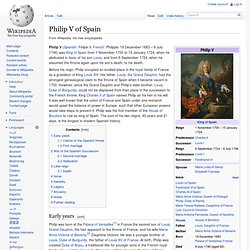
Before his reign, Philip occupied an exalted place in the royal family of France as a grandson of King Louis XIV. His father, Louis, the Grand Dauphin, had the strongest genealogical claim to the throne of Spain when it became vacant in 1700. However, since the Grand Dauphin and Philip's older brother, Louis, Duke of Burgundy, could not be displaced from their place in the succession to the French throne, King Charles II of Spain named Philip as his heir in his will. It was well known that the union of France and Spain under one monarch would upset the balance of power in Europe, such that other European powers would take steps to prevent it.
Early years[edit] Claims to the Spanish throne[edit] First marriage[edit] Louis Joseph, Duke of Vendôme. Louis Joseph de Bourbon, Duke of Vendôme (Louis Joseph; 1 July 1654 – 11 June 1712) was a French military commander during the War of the Grand Alliance and War of the Spanish Succession, Marshal of France.
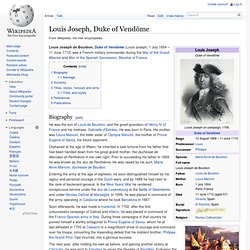
Biography[edit] He was the son of Louis de Bourbon, and the great-grandson of Henry IV of France and his mistress, Gabrielle d'Estrées. He was born in Paris. His mother was Laura Mancini, the elder sister of Olympia Mancini, the mother of Prince Eugene of Savoy, his future opponent. Orphaned at the age of fifteen, he inherited a vast fortune from his father that had been handed down from his great-grand mother, the duchesse de Mercœur et Penthièvre in her own right. Entering the army at the age of eighteen, he soon distinguished himself by his vigour and personal courage in the Dutch wars, and by 1688 he had risen to the rank of lieutenant-general.
In disgust, Vendôme retired to his estates. Claude Louis Hector de Villars. Claude Louis Hector de Villars, Prince de Martigues, Marquis then Duc de Villars, Vicomte de Melun (8 May 1653 – 17 June 1734) was the last great general of Louis XIV of France and one of the most brilliant commanders in French military history,[1] one of only six Marshals who have been promoted to Marshal General of France.
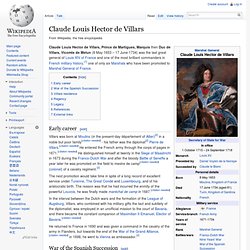
Early career[edit] Villars was born at Moulins (in the present-day département of Allier)[2] in a noble but poor family[citation needed] - his father was the diplomat[2] Pierre de Villars. [citation needed] He entered the French army through the corps of pages in 1671. [citation needed] He distinguished himself at twenty in the Siege of Maastricht in 1673 during the Franco-Dutch War and after the bloody Battle of Seneffe a year later he was promoted on the field to mestre de camp[citation needed] (colonel) of a cavalry regiment.[2] Louis XIV of France. Louis XIV (5 September 1638 – 1 September 1715), known as Louis the Great (Louis le Grand) or the Sun King (le Roi-Soleil), was a monarch of the House of Bourbon who ruled as King of France from 1643 until his death.[1] His reign of 72 years and 110 days is the longest of any monarch of a major country in European history.[2]
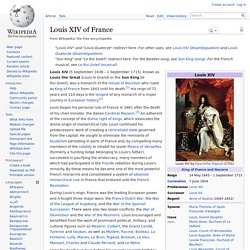
James FitzJames, 1st Duke of Berwick. History[edit] Berwick returned to England and was made Governor of Portsmouth.
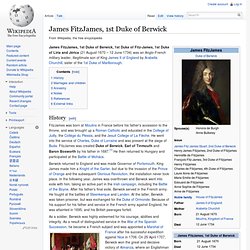
King James made him a Knight of the Garter, but due to the invasion of the Prince of Orange and the subsequent Glorious Revolution, the installation never took place. In the following year, James was overthrown and Berwick went into exile with him, taking an active part in the Irish campaign, including the Battle of the Boyne. After his father's final exile, Berwick served in the French army. He fought at the battles of Steenkerque and Landen. Marriages and children[edit] James FitzJames, Duke of Berwick Berwick had children by both his marriages. James was married first to Honora, Comtesse de Lucan (née Lady Honora Burke), on 26 March 1695. James Francis Fitz-James Stuart, or Jacobo Francisco Fitz-James Stuart, 2nd Duke of Berwick, 2nd Duque de Liria, 2nd Duque de Xérica (21 October 1696 – 2 June 1738, Naples, Italy).